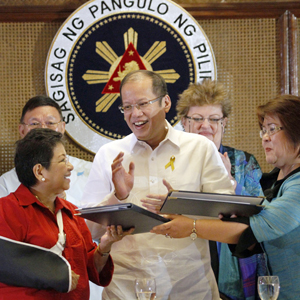MANILA (PinoyNews) – The implementing rules and regulations (IRR) of Republic Act No. 9745 otherwise known as the Anti-Torture Law has been signed in ceremonies at Malacanang with President Benigno Aquino III serving as witness lin manifestation of his administration’s resolve to uphold human rights.

ANTI-TORTURE LAW. President Benigno S. Aquino III applauds as Commission on Human Rights chairperson Loretta Ann Rosales (left) and Justice Secretary Leila de Lima exchange documents after the signing of the Implementing Rules and Regulation(IRR) of Republic Act 9745 otherwise known as the Anti-Torture Law.
The IRR was signed by Justice Secretary Leila de Lima and Commission on Human Rights (CHR) Chairperson Loretta Ann Rosales during the celebration of the International Human Rights Day and the 62nd anniversary of the Universal Declaration of Human Rights in Malacanang .Among those present were Cabinet officials and members of Congress and the diplomatic corps.
The IRR signing provided for the effective implementation of the Anti-torture Law which criminalizes “torture and other cruel, inhuman and degrading treatment or punishment.”
The Philippines is a signatory to the UN Convention Against Torture and other Cruel, Inhuman or Degrading Treatment or Punishment, an international human rights instrument that aims to prevent torture around the world.
In his speech, the President said human rights protection has become universal since the signing of the UDHR in Paris in 1948.
“The Philippines as a signatory to most of the major international human rights treaties and instruments must live up to its commitment in contrast to the dark era that once engulfed us. We are now making certain that our commitments to those treaties do not remain paper promises because for the first time in nearly a decade we a have a government that is indeed serious about human rights,” he said.
The President stressed that his administration is serious in its commitment to protect the rights of Filipino citizens and violators held accountable for their actions.
To further protect human rights, the President said the Philippine National Police (PNP) has crafted a Human Rights Desk operations manual, while the Armed Forces of the Philippines (AFP) established a Human Rights Office under General Domingo Tutaan and is set to publish a handbook.
The President said the PNP manual and the AFP handbook will both provide information and operational procedures to orient troops and policemen on human rights and international humanitarian law.
Dr. Jacqueline Badcock, Resident Coordinator of the UN in the Philippines who read the UN message for the 62nd anniversary of the UDHR, commended the human rights initiatives of the Philippines in partnership with the community, civil society and other human rights defenders in the country.
“I wish to congratulate the Philippine government for being the first and perhaps the only country in the world, to disembark on the pioneering endeavor to mainstream human rights in development planning,” Badcock said.
In partnership with the National Economic and Development Authority (NEDA) and the CHR, Badcock said the UN system in the Philippines has been assisting in the capacity development of NEDA in the national and regional levels and government line agencies on how to mainstream human rights in the planning processes.
Badcock said this was recently concluded in time for the formulation of the Medium Term Philippine Development Plan (MTPDP).
“This is very relevant given the value and need for reintegration of the human rights perspective in the MTPDP if the country is to meet the Millennium Development Goals (MDGs) in 2015. MDG is our basic human rights entitlements to preserve and protect human dignity,” Badcock said.
Badcock cited the National Human Rights Action Plan recently drafted out of a series of consultations participated by various sectors in the country.
If adopted by the government, Badcock said this action plan will be a very good problem solving mechanism to successfully overcome human rights issues and challenges through the joint efforts of the government agencies, human rights defenders and the people as the human rights claim holders.
“I am very encouraged to see that today the IRR for the Anti-Torture Law will be signed which is a very great significance,” Badcock said.
Badcock acknowledged the efforts of the Office of the President, CHR, DOJ, civil society, and the national and local government agencies which continue to work hard to make human rights protection a reality here in the Philippines.



 ShareThis
ShareThis